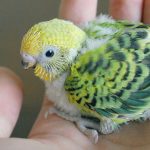Birds
How Long Does it Take for Parakeet Eggs to Hatch? #Fertile #Incubator
Parakeets are small and medium-sized parrots and offer you an enhanced experience in achieving the best possible experience. But, when it is the time to find your parakeets growing their family, you need to be extremely careful in handling them and their eggs rather efficiently.
Contents
- 1 How Long Does it Take for Parakeet Eggs to Hatch?
- 2 How Long Does it Take for a Parakeet to Lay an Egg?
- 3 How Many Eggs do Parakeets Lay?
- 4 How Many Times a Year do Parakeets Lay Eggs?
- 5 How to Tell if a Parakeet Egg is Fertile?
- 6 How Often do Parakeets Lay Unfertilized Eggs?
- 7 When to Remove Unhatched Eggs?
- 8 My Parakeet Laid an Egg on the Cage Floor, what to do?
- 9 How to Incubate Budgie Eggs Without an Incubator?
- 10 The Concluding Thoughts
How Long Does it Take for Parakeet Eggs to Hatch?
It can take anywhere between 17 to 20 days for a parakeet egg to hatch. The standard time taken for the parakeet eggs to hatch would ideally be 18 days. If the eggs should hatch, the female parakeet should sit on them rather constantly. The first egg will hatch in 18 days, and subsequently, one egg will hatch every day – precisely in the order, they are laid.
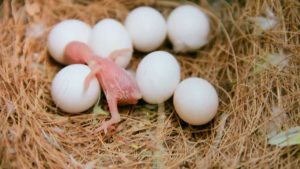
How Long Does it Take for a Parakeet to Lay an Egg?
How long does it take for the parakeet to lay an egg will depend upon the mating that has occurred between the male and female birds. The female bird will begin laying eggs approximately 30 days after the mating. If the male has fertilised her, she will lay one egg every two days. The total number of eggs will be between 3 to 8.
Ideally, the female parakeet will begin laying her eggs one or two days after mating if the fertilisation has actually happened. Once the total number of eggs has been laid, you can choose to whether to keep all of them and decide to keep a few of them.
Before the parakeet’s mate, they need to get bonded first. The mating behavior of parakeets is quite unique. You will find the pinkish spot on the beak of a female parakeet turning into brown, indicating that they are ready to mate and accept the invitation from the female. Once they are ready to mate, they will sit together for hours and kiss one another. The female will lean against the perch and raise her tail. The male rubs his vent against the same spot on the female. The male does not have a penis. The female may be bred for several days. The female will use the beak to move the sperm to the right area.
The laying of eggs will start in around 30 hours of the mating. The eggs may be laid even without breeding and fertilisation, but they will not hatch.
How Many Eggs do Parakeets Lay?
The number of eggs laid by parakeets depends on the species of the parakeets. Expert Parakeets lay around 4 to 6 eggs per cluster. The Monk parakeets can lay 5 to 12 eggs per cluster. The Budgerigar parakeets are known to lay 4 to 6 eggs per clutter.
The ideal number of eggs laid by a parakeet would be around 4 to 8 in number, and these eggs are laid one every two days. Each of these eggs will take around 18 days to hatch. The eggs will begin hatching precisely in the same order that they are laid. If an egg does not hatch after 23 days, you can consider it dead and discard the same. It will not hatch or produce any chick.
How Many Times a Year do Parakeets Lay Eggs?
The parakeets lay eggs in around two to three clutches every year. Each of the clutches would have around 4 to 6 eggs. Female parakeets begin laying their eggs soon after they are mated. It is quite likely to find your parakeet laying its eggs once every day or once every two days.
The parakeets are known to begin laying eggs during the spring season. They can even lay eggs without being fertilised by a male, but such eggs will not hatch. The breeding will take place if the environment and the other conditions are conducive enough for mating and subsequent laying of eggs.
In the wild, the parakeets can breed and lay eggs in two to three clutches a year. They can lay eggs more often when in captivity, but it is advisable to avoid such an eventuality.
How to Tell if a Parakeet Egg is Fertile?
Candling is one of the excellent means to find if a parakeet egg is fertile or not. You need to shine a bright large light on the egg. The light from the torch will let you find the insides of the egg. If you can find red veins, it is an indication that the egg is fertile. If the egg is well developed, you should also find the outlines of a young bird inside the egg.
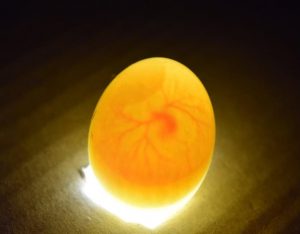
Do note that the candling should be used only when it is absolutely needed to do. Parakeets may decide to reject the egg if it smells different, and she will decide that the egg is not hers. You can opt for candling only if the egg has been moved to a side or you suspect any issues with respect to the fertility of the egg. It is advisable to handle the parakeet egg while wearing gloves. It is also advisable to hold the egg between your thumb and finger. Holding it in your hand may not be the right option for obvious reasons. You would not want your parakeet mother to reject the egg just because it is handled by you.
How Often do Parakeets Lay Unfertilized Eggs?
You may not be able how many times does a parakeet lay unfertilized eggs. The parakeets can lay eggs even without mating, and when that happens, the resultant eggs will not hatch. The case of unfertilised eggs can happen when the female parakeet does not have a male companion, or in cases where the male companion has not mated with the female enough of times.
If you have a single parakeet as a pet, there is no male to fertilise it, the eggs laid in those circumstances will always be unfertilised. It would be advisable to remove such eggs from the cage once the bird has stopped laying eggs. Do not remove the eggs when the bird is still laying the eggs as she will continue laying eggs in such a case.
When to Remove Unhatched Eggs?
An unhatched parakeet egg will not hatch once it has crossed 23 days. Parakeet eggs begin to hatch in 18 days. Since they will hatch in the order they are laid, it would be advisable to wait till 23 days have passed. Once you have crossed 23 days, you can remove the unhatched eggs.
The standard hatching process will take 18 days, but you may find it taking a little longer in cases where the ambient temperature is cooler enough. If it is just one or two eggs, it may be enough to leave the eggs in the nest box. The egg will eventually get broken and get invisible within days.
My Parakeet Laid an Egg on the Cage Floor, what to do?
Nothing to worry about it. If you are sure that the eggs are fertile, you can let the parakeet lay its eggs there. Removing the eggs from the place can fixate her. Some parakeets do not like using the nest boxes and can lay their eggs at the bottom of the cage.
If you find the bird is not willing to use the nest box, it may be a good idea to use a soft towel or a cloth under the eggs so that they are not damaged. The cloth you should be such that the toenails do not get stuck inside. If the eggs are not fertile and you know it, you can remove the eggs when the bird is not looking at it.
How to Incubate Budgie Eggs Without an Incubator?
The best way to incubate a parakeet egg without an incubator is to provide it a consistent heat. You can find a substitute mother to hatch the egg, use a heating pad, use a rice-filled tube sock, or use a disposable hand warmer. These are just a few methods to incubate a parakeet egg without an incubator.
The best way to create the best setup for incubating the parakeet egg without heat will need the following products:
- Ceramic bowl
- Water
- Microwave oven
- Hand towel
- Heat lamp
Here is how you would create an almost incubator like apparatus:
- Fill water in the ceramic bowl
- Microwave it at medium heat for several minutes
- Remove the bowl and empty the water from the bowl.
- Dampen the hand towel with warm water
- Wrap the eggs in the towel and place them in the bowl.
- Place the bowl under a heat lamp
- Flip the egg every six to eight hours.
Take care to handle the eggs carefully. Never shake the egg as it may damage the bird inside.
Do note that this method can only help you hatch 50 percent of the eggs.
The following video should provide you make a simple homemade incubator:
The Concluding Thoughts
Hatching a parakeet egg can take a considerably easier option. In fact, nature takes its own course, and you should find the mother parakeet hatching the eggs rather quickly. The knowledge of the hatching process, as discussed above should ideally help you get access to an enhanced experience in how to hatch your parakeet egg.

-
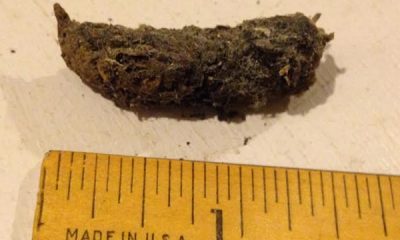
 Skunk4 years ago
Skunk4 years agoWhat Does Skunk Poop Look Like? Images & Identifications
-

 Bunny4 years ago
Bunny4 years agoHow to Get Rid of Mites on Rabbits? #NaturalRemedies #Video
-
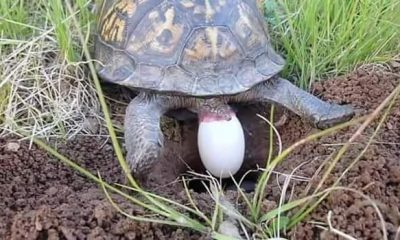
 Turtles4 years ago
Turtles4 years agoHow To Take Care of Turtle Egg At Home?
-

 Horse4 years ago
Horse4 years agoHow Much Weight Can a Horse Carry? #Clydesdale #Friesian #Mustang #Draft
-

 Turtles4 years ago
Turtles4 years agoHow to Take Care of Snapping Turtle Eggs? #Incubating #Hatching
-

 Bunny4 years ago
Bunny4 years agoHow Big Do Dwarf Bunnies Get? – Amazing Facts #Images
-

 Bunny4 years ago
Bunny4 years agoHow to Potty Train a Rabbit in House? Tips on Litter Training
-

 Turtles4 years ago
Turtles4 years ago8 Basking Rocks/ Platforms for Turtles – A Perfect Guide

